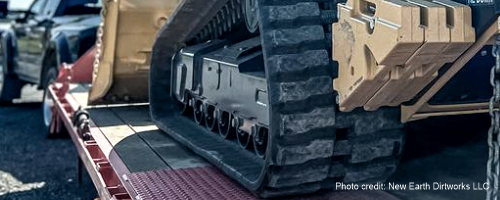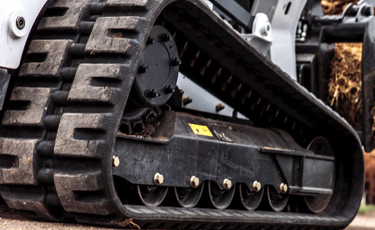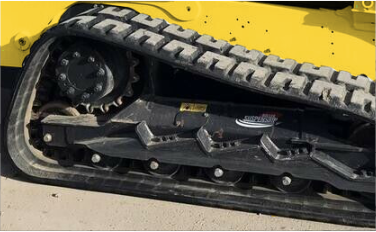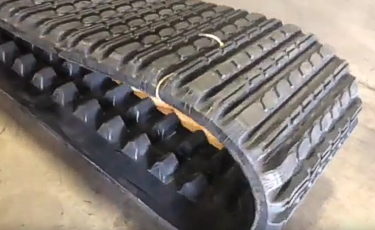Getting the most mileage out of your rubber tracks

There’s nothing quite like a new set of rubber tracks on your trusty machine. The improved grip, responsive handling, and good looks make the investment worth every penny. However, as great as it is to enjoy a new set of tracks, your bank account would appreciate keeping the current pair as long as possible. To that end, Rubbertrax has a few tips to help you get the most value out of your rubber tracks.
Keep Them Clean
While it might sound like a simple idea; regular cleaning of your rubber tracks is an important step in improving their longevity. In fact, you should clean them along with your undercarriage daily after each use, if possible. Whenever dirt and debris sit on your tracks and are allowed to harden, you are inviting potential issues. Hardened clay in the track guides can cause excessive wear at the points wear sprockets and rollers make contact. The extra weight can cause over-tensioning and lead to drive motor stress and more.
Avoid Direct Sunlight
Your rubber tracks are not vampires or creatures of the night, but they do need protection from the sun. You may have noticed cracks that may appear in old rubber tracks or tires. The cause of those cracks is ozonolysis, also known as ozone cracks. There’s a lot of science to it, but the three ingredients needed to make it happen are rubber, tension, and sunlight. You can see where this is going. So, how do help slow this process? Well, it’s not too hard to do. If your machine is going sit outside while not in use, park it under a tree or cover it with a tarp. Access to a warehouse or garage will also help limit exposure. Plus, the decreased temperature variation will benefit your entire machine.
Check for Proper Tension
This is an important one. Proper tension is not a one size fits all setting. You need to check and adjust your track tension to match the environmental conditions present on the job site each day. A general rule for tension is that you want less tension on soft ground and tighter tension on hard ground. Consult your machine operator’s manual for the correct settings.
Limit High Speed Operation
Slow and steady wins the race when it comes to protecting you rubber tracks. Higher speed causes more vibration and friction as the tracks try to find grip to move your machine forward. Why is that important? Vibration and friction combine to increase the rate of wear on your rubber tracks. In addition to the potential damage to your undercarriage parts, your rubber tracks will be under increased stress as speed increases. That stress, along with rubber tracks that are not well maintained or near the end of their life can lead to disastrous results on the job site. Bottom line, slow down.
Proper Turning Techniques
As you can see, it is the little things that add up to help extend the life of your rubber tracks. Just be sure to keep machine clean, avoid prolonged direct sunlight, keep proper tension on your rubber tracks, limit high speed operation, and utilize proper turning techniques. As an added bonus, several of these tips will also help extend the life of your undercarriage and drive components. Proper maintenance is key to keeping your skid steer or excavator at peak performance and to help avoid downtime due to a nonfunctional machine. Of course, when you do decide that it is time to replace your rubber tracks, we hope that you will consider Rubbertrax as your preferred rubber track supplier.


